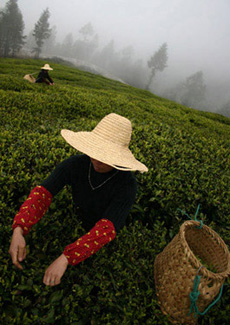
 Harvesting white tea. Photo courtesy of Rishi Tea. Harvesting white tea. Photo courtesy of Rishi Tea.
August 2005
Updated January 2009
|
 |
Information About Tea: Essential Tea Facts
Page 2: The Word “Tea”
This is Page 2 of a 4-page article. Click the black links below to view the other pages.
The Word Tea
The Chinese character for tea is pronounced very differently in the various Chinese dialects. Two pronunciations have made their way into other languages around the world. One is te, which comes from the Minnan dialect spoken around the port of Xiamen (Amoy). The other is cha, from the Cantonese dialect spoken around the ports of Guangzhou (Canton) and Hong Kong, and in the Mandarin dialect of northern China. A third prominent pronunciation in China is zu, used in the Wu dialect spoken around Shanghai.
- Languages that have te derivatives include Armenian, Danish, Dutch, English (tea), Finnish, Estonian (tee), French, German (tee), Hebrew (te or tei), Hungarian, Icelandic, Indonesian, Italian (tè), Latvian, Malay, Norwegian, Polish (herbata from Latin herba the), Singhalese, Spanish (té), Swedish (te), Tamil (thè), Yiddish and scientific Latin.
- Those that use cha derivatives include Albanian, Arabic, Bulgarian, Croatian, Czech, Greek, Hindi, Japanese, Korean, Nepali, Persian, Portuguese, Romanian, Russian, Serbian, Slovene, Swahili, Thai, Tibetan, Turkish, Ukrainian and Vietnamese.
- It is tempting to try to relate the usage of the two different words with the route that was used to deliver tea to the particular cultures, but it does not track. For example, most British trade went through Canton, which uses the word cha, while Brits use the word tea.
- There are some small exceptions. In Dublin, cha is sometimes used for tea, and char was a common slang term for tea throughout British Empire and Commonwealth military forces in the 19th and 20th centuries, crossing over into civilian usage.
- In most of South America, any tea is referred to as mate. A stimulant beverage, yerba mate, was consumed there long before tea arrived. It may be the only place in which a word unrelated to tea is used to describe the beverage.
Continue To Page 3: Antioxidants & Health
Return To Article Index At The Top Of The Page
© Lifestyle Direct, Inc. 2005-. All rights reserved. Images are the copyright of their respective owners.

|


 Harvesting white tea. Photo courtesy of
Harvesting white tea. Photo courtesy of